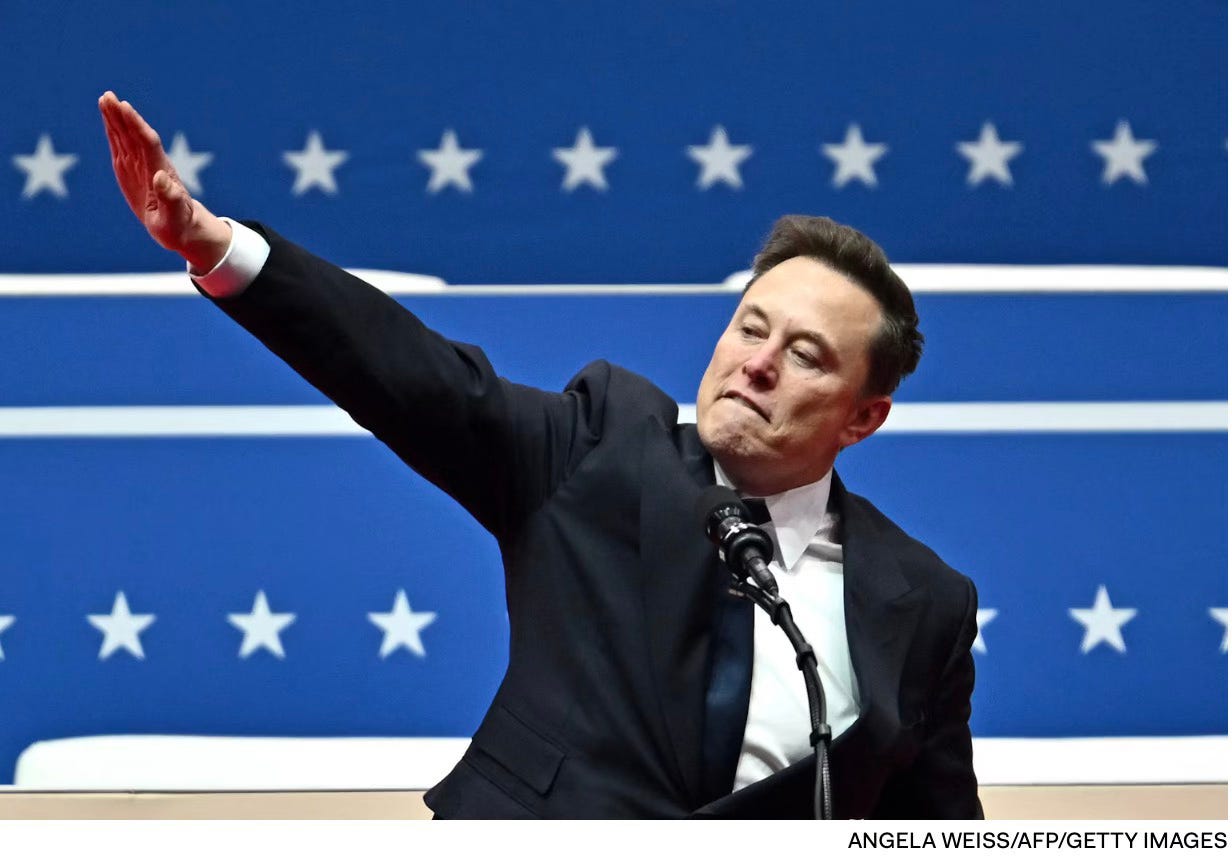As I noted in a previous post, in his story, Deutsches Requiem, Jorge Luis Borges, presented the musings of Otto Dietrich zur Linde, a former concentration camp commandant in his prison cell on the eve of his execution for war crimes. Zur Linde accepts his fate with equanimity, even as a vindication:
An inexorable epoch is spreading over the world. We forged it, we who are already its victims. What matters . . . so long as violence reigns and not servile Christian timidity? If victory and injustice and happiness are not for Germany, let them be for other nations. Let Heaven exist, even though our dwelling place is in Hell.
This immediately came to mind when I saw this:
This as not the sole homage to genocide and white supremacy at President Trump’s inauguration. At the risk of being accused of spreading “critical race theory,” I will mention some examples.
In his address, Trump at last started to answer the question, when was America great? He recalled, “Americans pushed thousands of miles through a rugged land of untamed wilderness.” Far from being an”untamed wilderness,” however, Pre-Columbian North America had a population variously estimated at 3.8 to 18 million people. In the year 1500 there were populations in that range in France, the Ottoman Empire, Japan, Spain, the Polish-Lithuanian Commonwealth, Muscovy, Vietnam, and Iran. What later generations of European settlers described as “untamed wilderness” was the deserted habitat of millions who had perished from disease, massacres, forced displacement, and enslavement and other forms of forced labor.
And who “tamed” that “wilderness?” According to Trump,
They were farmers and soldiers, cowboys and factory workers, steelworkers and coal miners, police officers and pioneers who pushed onward and marched forward and let no obstacle defeat their spirit or their pride.
Omitted from this account are the enslaved Africans who built, among other things, the White House and the U.S. Capitol building.
Trump portrayed as nativist patriotism his intention to change the name of the Gulf of Mexico, from that of a meso-American civilization, to the Gulf of America, named for a fifteenth century Italian, Amerigo Vespucci.
He invoked theU.S.’s Manifest Destiny, a doctrine claiming a divine mandate for seizing land from its native inhabitants, killing and displacing them. As part of that destiny, he laid claim to the Panama Canal, where, he said, the United States “lost 38,000 lives in the building the Panama Canal.” The workers who died, however, were mostly not citizens of the U.S.: over three quarters were contract workers recruited from the “shithole countries” of the Caribbean. They were the ancestors of the undocumented workers whom Trump now wants to deport and whom he slanders as criminals and asylum inmates.
Trump claimed, “My proudest legacy will be that of a peacemaker and unifier. That's what I want to be: a peacemaker and a unifier.” The immediate example he gave was that “the hostages in the Middle East are coming back home to their families.” Neither he, nor any of the clergyman who mentioned the hostages in their benedictions, breathed a word about the ceasefire in Gaza, where Israel’s genocidal offensive killed over 48,000 people and left entire cities of rubble, concealing the corpses of the slain.
Trump noted that his inauguration took place on Martin Luther King Day, which so many of his supporters had opposed honoring as a holiday. He sullied King’s name by claiming that this supremacist program would “make his dream come true.” And he did all this in the name of a God who supposedly saved Trump’s life for a sacred purpose, but who allowed Dr. King to be assassinated.
Once again, the greatest crime is silence.





Thank you.
Excellent article!